
When I moved to Milwaukee twenty-one years ago, one of the things that attracted me was the City's proximity to Lake Michigan, its rivers, and Wisconsin's pristine outdoors. I love being close to water and hiking and biking with my family. I love being in cities that connect people and vibrant urban amenities to natural beauty, like Milwaukee's Riverwalk. The Environmental Collaboration Office (ECO) is building on our water assets and offering practical tools to improve the environment, our economy, and our neighborhoods. We are working to make Milwaukee a world class eco-city on America's Fresh Coast. Under Mayor Barrett's leadership, we are
working to be a positive example for Wisconsin, America, and the world. In this newsletter, you'll find how we are putting Milwaukee on a path for sustained economic growth with our new Water Centric City initiative, acting on climate change, revitalizing neighborhoods through our HOME GR/OWN program and new ECO Neighborhoods Toolkit, accelerating energy efficiency in commercial buildings through our Better Buildings Challenge, exploring Smart Cities technologies, and broadly collaborating with organizations that share our common vision. Like and share us on Facebook @MKESustain and follow us on Twitter @ecoCityMKE for our most up-to-date activity.
Milwaukee is demonstrating that protecting the environment and sustained economic growth go hand-in-hand. Time and again, we are demonstrating that with smart policy, you can have private sector job growth, improve the livability of our built environment, and restore ecosystems. Smart environmental leadership and action help keep America strong. Developing the economy balanced with fair rules to protect the common environment also helps build a more peaceful, livable planet Earth. We all have to be responsible stewards of our air, land, water as part of caring for our common home.
While we focus on local action, the environment crosses political boundaries. So it's equally important to support good environmental policy at the state and federal levels and remind ourselves how far we've come. History has plenty of examples of the US government taking bold actions to sustain the environment. Congress and Teddy Roosevelt developed the national parks and the National Parks Service
over time to protect America's natural wonders from exploitation. Franklin D. Roosevelt created the Soil Erosion Service in response the environmental catastrophe of the Dust Bowl
. The Endangered Species Act has allowed several species to come back from the brink of extinction. The
Clean Water Act coupled with local investments has transformed the Milwaukee River
from an open sewer to an asset for downtown revitalization. And
President Barack Obama took smart environmental actions
including raising fuel economy standards, helping launch the electric vehicle industry, expanding national parks, and showing global leadership on climate change through the Paris climate accord. These leaders understood environmental regulations, laws, public programs, and dedicated civil servants were necessary to protect the common good, in addition to the actions of responsible individuals. In all of these cases, government responded to the aspirations of the American people and a sense of responsibility to our great land. Wisconsin has its own tradition of environmental leadership
, including John Muir, Aldo Leopold, and Gaylord Nelson, founder of Earth Day.
Unfortunately, the current administrations at the state and federal level have been undermining Wisconsin's and America's best traditions around the environment. They ignore the need to address climate change which threatens our health and economy, most notably through the increased risk of floods. They argue that job creation and freedom justify a roll-back of environmental protections. Yet well-crafted regulation is not a burden on freedom for those who do the right thing anyway, or who understand that we need to adapt for the common good. Milwaukee and American cities have rebounded economically in part because they are now cleaner, less polluted and less degraded. While some businesses see environmental rules only as a nuisance, many businesses now understand that sustaining the environment with predictable and straightforward environmental rules helps sustain profits for the long term.
With the US government now undermining
America's great environmental legacy
, it's now more important than ever for the community and local government to stand up to fight for sound environmental policy. Mayor Barrett and the Milwaukee Common Council have joined with hundreds of cities and thousands of businesses to say
"We Are Still In"
on the Paris climate accord. We have
republished EPA data on climate change
and are taking our own
climate action
. We are standing up against massive cutbacks to state and federal investments in environmental education, research, innovation, and protection. As the State of Wisconsin works to support new business growth, I encourage them to conduct responsible due diligence on projects to create jobs while protecting our common water resources.
We will continue to lead by example and collaborate with the community on our shared vision. We've created new tools like our
ECO Neighborhoods Toolkit
and
Energy Engagement website
to help drive collective action. Together, we can achieve our vision of making Milwaukee a world class eco-city, and an example for Wisconsin, America, and the world.
BACK TO TOP
|
 |
Milwaukee Climate Action

Global climate change presents serious threats to our
environment, human health,
economy and equality,
 |
|
 |
Mayor Barrett signs the Common Council resolution upholding the principles of the Paris climate Accord, with Aldermen Murphy, Kovac, Johnson, and Bauman.
|
biodiversity, and national security.
The
National Climate Assessment
provides a good overview of the causes and effects of climate change. The report outlines the particular threats climate change poses to Wisconsin and the Midwest: "Extreme heat, heavy downpours, and flooding will affect infrastructure, health, agriculture, forestry, transportation, air and water quality, and more. Climate change will also exacerbate a range of risks to the Great Lakes." Acting on clim
ate
change means 1) reducing our use of fossil fuels
that is one of the leading causes of climate change and 2) proactively planning to adapt to it.
The City of Milwaukee is taking climate action.
Mayor Barrett has joined
over 362 mayors
to show that the City of Milwaukee remains committed to the principles of the Paris Agreement. The Milwaukee Common Council also unanimously passed
Council resolution 170337
pledging Milwaukee support of the principles of the Paris Climate Accord. And the City of Milwaukee has also joined 13 other US cities to re-publish EPA Climate information that had been removed from the federal website. Information is available at Milwaukee.gov/ClimateChangeIsReal
|
The City has launched its Water Centric Cities Initiative. The Water Centric City Initiative showcases Milwaukee's global leadership in managing our water resources in a
sustain
able and r
esi
lient way.
The City of Milwaukee's sustainability plan,
ReFresh Milwaukee
, set sustainability goals fo
r the City, including water. One of those goals was establishing Milwaukee as America's Water Centric City.
As a Water Centric City, we are showing how Milwaukee is building
a global identity around water, from our proximity on America's Fresh Coast, our economic development strategy through the Water Council, our academic leadership at the UWM School of Freshwater Sciences, and community collaboration with the Milwaukee Metropolitan
emphasize water stewardship.
 |
|
 |
Water is why we're here
|
- Water Leadership
- Gathering Place by the Water
- Water Technology
- Green Infrastructure
- Applied Water Research and Policy
- Fishable, Swimmable Waters
- Sustainable Water Supply
- Healthy Drinking Water
- On-Site Water Reuse
To apply the latest water research and policy, ECO is working with graduate students from the UWM School of Freshwater Sciences on on-site water reuse policy and green infrastructure policy.
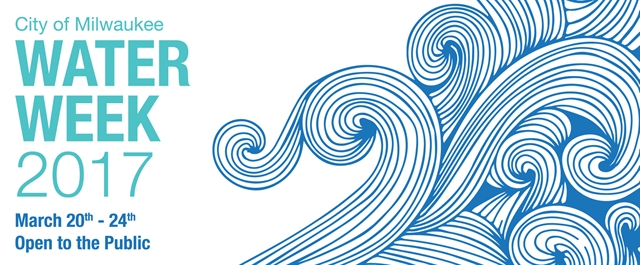
Water Week
To launch our Water Centric City initiative, ECO organized a Water Week around
the 2017 United Nations World Water Day, March 22, 2017. Every day that week, we partnered with the amazing water organizations working in Milwaukee to offer free events to the
public. A key highlight was a bus tour featuring John Gurda who discussed the historical importance of water in Milwaukee.
Thank you to everyone who came out and celebrated with us and are collaborating to make Milwaukee a Water Centric City. The Water Centric City initiative is supported by the Brico Fund.
Our partners included MMSD, Milwaukee Water Works, the Water Council, Southeastern Wisconsin Watersheds Trust Inc, Milwaukee Riverkeeper, Harbor District, River Revitalization Foundation, Discovery World, Milwaukee Water Commons, Clean Wisconsin, and Stormwater Solutions Engineering.
|
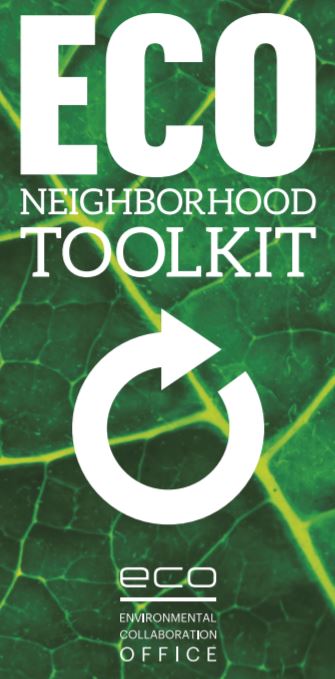
The Environmental Collaboration Office just published our
Eco-Neighborhoods Toolkit. The City of Milwaukee, MMSD, and many non-profit partners showcased in the toolkit provide ample opportunity for neighborhoods and faith groups to improve sustainability in their communities. Our toolkit is designed to connect residents with city and non-profit programs and help community organizers drive collective action in their communities. Together, we can make Milwaukee a world class eco-city on America's Fresh Coast!
|
HOME GR/OWN North Avenue Greenscaping and Fondy Park

ECO's HOME GR/OWN program transforms vacant lots into healthy green spaces, increasing healthy food access and neighborhood quality of life. In 2016 and 2017, HOME GR/OWN has two core projects: Greening North Avenue and creating a new eco-park next to the Fondy Food Center.
North Avenue Greenscaping
Continuing from 2016, HOME GR/OWN is improving the appearance
and quality of life along North Avenue between 8th - 27th Streets in the
Lindsay Heights neighborhood through our
N
orth Avenue Greenscape initiative
. In 2016, the City installed
48 new hanging flower baskets and improved
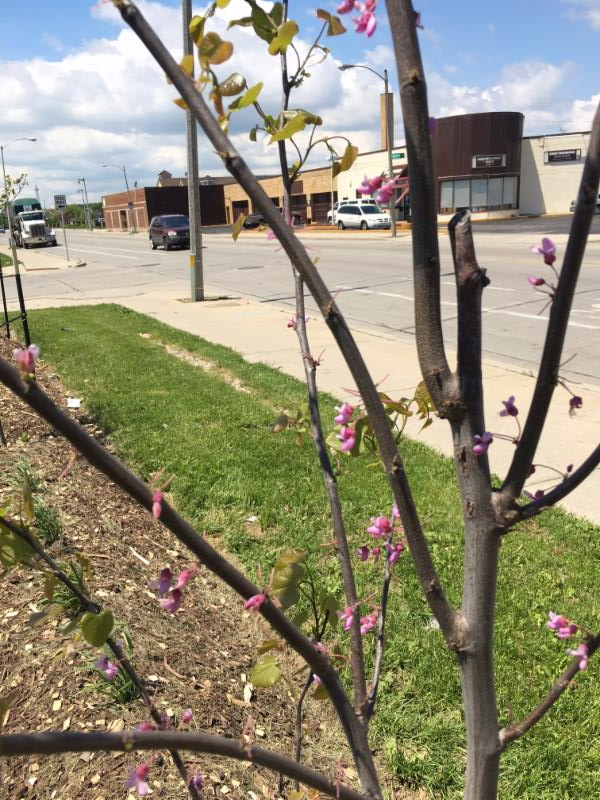
a number of City vacant lots with a landsca
ped green edge. The project is funded through a co
m
bi
n
ation of Zilber Neighborhood Initiative
fund
s and City funds, and is a joint city project of the Environm
ental Collaboration Office, Mayor's Strong Neighborhoods initiative, Department of City Development, Depar
tment of Public Works, Department of Neighborhood Services, and the North
Avenue/Fond du Lac Marketplace Business
Improvement District (Bid 32).
In May 2017, ECO and Alderman Russell Stamper II held a major neighborhood
m
eeting to get resident input on the project. We thank the 60 residents and
stakeholders who took the time to share their ideas for a better North Avenue. Responding to residents' interest in creating local jobs, HOME GR/OWN has hired Operation Dream which employs local teens to maintain Sunshine Park at 14th & North and other North Side HOME GR/OWN parks and
orchards. HOME GR/OWN is also working closely with the rejuvenated BID 32 in a major outreach to North Avenue property owners to in
 |
|
 |
Green Infrastructure at SDC parking lot beautifies North Avenue and is an example of our Water Centric City initiative
|
vest in their properties. Combining City and Zilber funds, the City launched a new North Avenue Facade Gra
nt program. Through the program, eligible commercial property owners can make up t
o $10,00
0
of exterior improvements for just $1,300 out of pocket!
In June at the Social Development Commission's parking lot at 17th and North, the City and SDC removed chain-link fencing and asphalt. The team added a new bioswale to manage stormwater and a landscaped edge running the length of the property. Thank you to the Fund for Lake Michigan and Department of Public Works for supporting this water-centric city project.
We've expanded the scope of the project down to 5th and North Avenue to includ
e the Bronzeville Neighborhood. Two greenscaping projects are planned at 6th & North and 7th & Garfield off the North Avenue exit ramp from I-43.
Fondy Park
In February, Mayor Barrett and Alderman Stamper announced the development of a new eco-park on a formerly unused vacant lot next to the
Fondy Farmers Market at 2200 W Fond du Lac Avenue.
Fondy Park is under construction now
.
Please join us on September 16th as we celebrate the park opening in conjunction with the Fondy Market's Centennial Celebration.
 |
|
 |
An underground stormwater vault is installed at Fondy Park |
All HOME GR/OWN projects are broad public/private partnerships. On the Fondy Pa
rk p
roject, the founding project team includes HOME GR/OWN, City Department of City Development (DCD), Reflo, Fondy Food Center (FFC), City Department of Public Works and the art collaborative ReciproCITY. UWM's Community Design Solutions was brought in early to help create the initial park vision.
Extensive community outreach by HOME GR/OWN and FFC during the winter design phase discovered community sentiment for a healthy, safe site focused around a stage for public events, art and music, extensive plantings for beautification, all on top of an extensive and innovative stormwater management system.
The Fondy Park includes a bioswale collecting water from the Fondy Market roofs, a stage for public performances, 19 new trees, brickwork, 1,500 new plants, custom seating including chess tables and a prairie. A custom fence and pathways were generously donated by David J. Frank Landscaping.
The project quickly came together thanks to the generosity of our major funders:
Milwaukee Metropolitan Sewerage District (MMSD), Fund for Lake Michigan, the Mayor's Strong Neighborhoods Plan, HOME GR/OWN, Veolia, Milwaukee School of Engineering, the Zilber Neighborhood Initiative, the Greater Milwaukee Foundation, and David J. Frank Landscaping. Trees at the park were jointly donated from the Roman Catholic Archdiocese of Milwaukee and the Greater Milwaukee Synod of the Evangelical Lutheran Church in America. We also thank our contractors: Simon Landscaping, Rozga Plumbing and Heating, Allcon Electric, GZA Environmental, and Walnut Way's Blue Skies Landscaping.
|
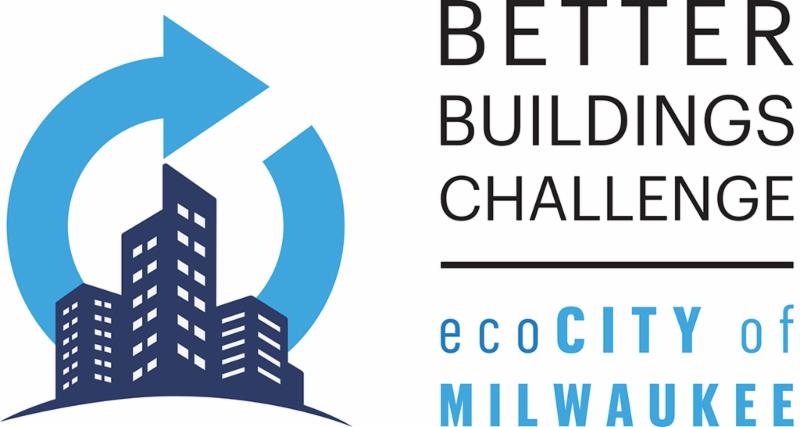 In August 2015, the City of Milwaukee received an award from the U.S. Department of Energy to help local buildings reduce their energy use 20% over the next decade. In September 2016, Milwaukee launched its enhanced
Better Buildings Challenge program. The Better Buildings Challenge provides building owners with all the resources they need to develop an energy efficiency project and operate more efficiently. To date:
- 48 non-City buildings have pledged to reduce their energy use 20% over ten years.
- 27 free energy assessments have provided buildings with recommendations to help them operate at the optimum level - free assessments are available to 73 more buildings.
 |
|
 |
The Better Buildings Challenge and USGBC-Wisconsin team up to recognize energy efficiency leaders
|
- $385,500 in potential annual savings identified.
- The potential saved energy represents carbon emissions equivalent to taking 472 cars off the road for one year.
In June 2017, the Better Buildings Challenge teamed up with the U.S. Green Building Council at their Transformation Awards to promote the launch of profiles of
BBC participants on the program website.
The Better Buildings Challenge also gave out the People's Choice Award to recognize participant successes to date.
1433 North Water Street took home the prize
. The Better Buildings Challenge program will hold its first stand-alone recognition event in October 2017 to celebrate participant successes.
The City's PACE financing program continues to offer financing for commercial building owners. The program has financed eight projects totaling over $13 million in construction. The program helped finance the
restoration of the Wally Schmidt Tavern - the home of the new Tandem restaurant - which was featured on Wisconsin Public Radio.
|
|
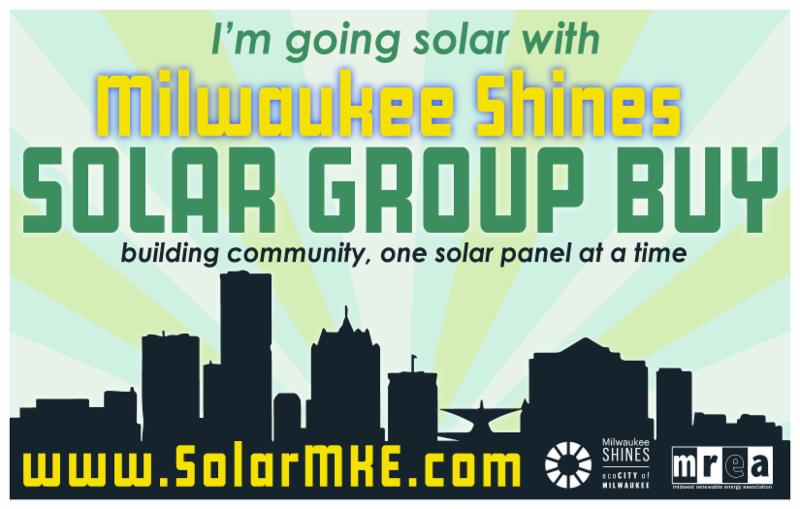
Milwaukee Shines once again partnered with the renewable energy non-profit the Midwest Renewable Energy Association (MREA) to coordinate our 2017 neighborhood
Solar Group Buy Program.
A solar group buy is when community members form a group and use their collective buying power to save on the total cost of going solar. Milwaukee's program also offers affordable financing through Summit Credit Union.
Group buy programs work because
Milwaukee Shines and the
MREA conduct a lot of community outreach, hold education sessions (called Power Hours), work with an Advisory Committee to select one qualified solar installer who can handle a large volume of work in a short amount of time, educate customers on financing options, and celebrate the successes of the program. A unique aspect to this year's program was that the City of Milwaukee collaborated with the MREA on their Solar Tosa program in the Village of Wauwatosa to run concurrent solar group buy programs.
We are thankful for all of our community partners
including Colectivo Coffee, 91.7 WMSE, Milwaukee Public Libraries, Urban Ecology Center, Sugar Maple Bar, Camp Bar, Red Dot, Tosa Yoga and the Brookby Foundation. Get started on making solar part of your home, today!
|
 |
|
 |
Mayor Barrett calls on Congress to fully fund the Great Lakes Restoration Initiative
|
In addition to regular outreach on ECO's program, ECO collaborates with the community on a range of events to inspire sustainable action.
We Are Water
ECO supports the Water Commons
We Are Water celebration
of the Great Lakes this Sunday, August 6th from 6:30-9pm at Bradford Beach.
Speaking out for the Great Lakes
In March, Mayor Barrett and other local leaders stood up against federal budget cuts that would have decimated the Great Lakes Restoration Program. Check out Milwaukee's video here on the
importance of continued GLRI funding
Sustainability Summit
In April, ECO sponsored MATC's annual
Sustainability Summit. Mayor Barrett provided an opening welcome and ECO staff members discussed
topics ranging from Energy Efficiency to Water and the City's Eco-Industrial Districts.
March for Science
ECO believes that science should inform policy. In April, ECO supported the March for Science and the
Milwaukee Area Science Advocates in their work to raise the profile of science education and public policy.
Water Leaders Summit 
In May, Mayor Barrett and ECO staff participated in the
Water Council's Water Leader's Summit. This world class summit described how global water issues can be either a source of conflict or, preferably, an opportunity for peaceful collaboration.
Smart Cities events
The City of Milwaukee's Environmental Collaboration Office together with the Mid-West Energy Research Consortium (MWERC) is working to add the City of Milwaukee to a growing list of Smart Cities in the nation. This Smart Cities initiative was created to meet the sustainability goals of Milwaukee by reducing waste and to increase the life quality of residents by putting people first and stressing the use of technology as a tool to use in service of the citizens of Milwaukee. This work is has been covered by the
Milwaukee Journal Sentinel
and
Milwaukee Business Journal.
Green Schools Conference 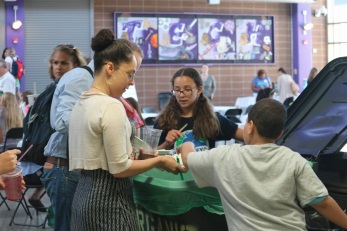
Engaging schools on sustainability is an important way to educate the next generation on the importance of environmental sustainability. In June, ECO sponsored the
Green Schools Conference, hosted by the
Green Schools Consortium of Milwaukee to help schools develop green infrastructure project, identify energy efficiency opportunities, and create healthier school environments.
Wisconsin Academy's Local Government Summit: Building Sustainable Communities through Energy & Resilience
River Clean-Up/Rock the Green 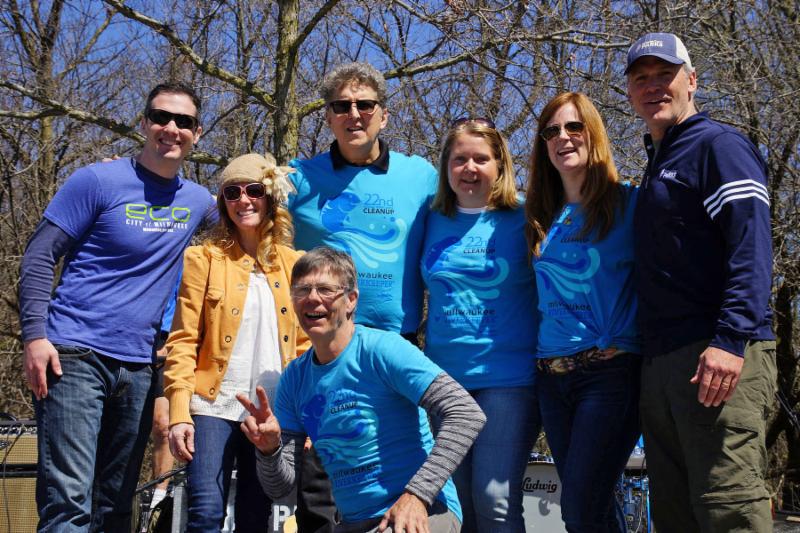
This year,
Milwaukee Riverkeeper and
Rock the Green teamed up to support joint Earth Day activities. ECO is a proud supporter of both events to uphold Wisconsin's historic leadership position on protecting the Earth. ECO will also help sponsor Rock the Green's main event on September 9th, featuring Ben Harper!
MEC Connect is new web resource for Milwaukee's "ecommunity."
ECO is a p
roud sponsor of
MEC Connect
, a new web resource to connect Milwaukee's environmental community
,
hosted by the Milwaukee Environmental Consortium. Find volunteer opportunities, keep up on news from a range of environmental organizations, and get involved.
ECO works to engage a diverse communities on sustainability, including communities of faith. ECO worked with Wisconsin Interfaith Power & Light, the Archdiocese of Milwaukee and others to provide practical guidance on how to take sustainability action. Marquette University recently published a
Flipping the Default Toolkit based on the Catholic faith tradition.
Newaukee Night Market 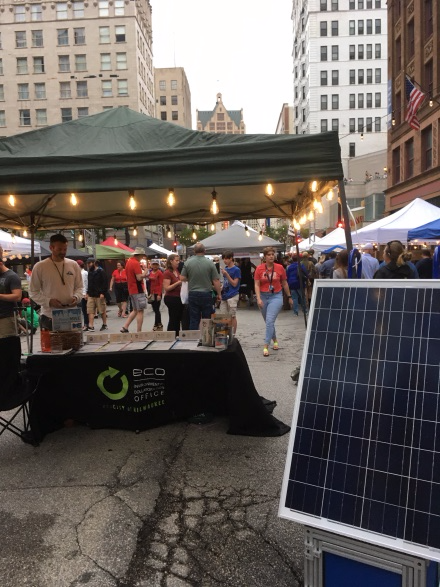
The Environmental Collaboration Office (ECO) is enjoying the
Newaukee Night Market this summer, so stop by to check out our solar-powered LED lights and all of the great programs the City offers! While June was a bit stormy, turnout was still great and we are looking forward to the last two events:
Our booth is located between 2nd & 3rd, in the middle of Wisconsin. Hope to see you there!
|
|